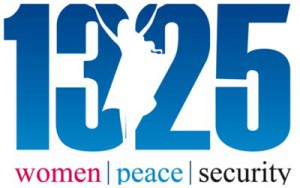28th October 2015 Khartoum
Women, Peace and Security: 15 years on
One of the privileges of being a woman in Sudan has been in being welcomed into the homes of families and spending time with other women. During one of my trips to the North of Sudan, my husband and I were welcomed into a family house near Kerma and as normal I joined the women and children, chatting away over cups of tea. After discussing a favourite topic of Sudanese beauty treatments I noticed my host’s young daughter had fresh henna on her hands and asked if it was for a special occasion. Although before they had finished explaining, it dawned on me, that she had just recently undergone female genital cutting.
FGC is prevalent in much of Sudan. However, this was the first time the issue had really hit home. Living in Khartoum, it is easy to be unaware of the issues that face women across Sudan. We hear of statements and data collected but very often they are too big to comprehend and the voices of the people behind those figures are lost. This is exacerbated by the stigma attached to speaking out, as to do so, often means going against deep rooted social traditions.
However, there are those, such as the Sudanese women activists, who are brave enough to raise these issues publicly and thereby ensure that women and girls’ voices are heard. Speaking out on issues like FGC, child marriage and gender based violence, including sexual violence in conflict, in the public sphere, brings them to the forefront of politics and can ensure that the reality of life in Sudan for women, matches with the rights they have enshrined in Sudanese law.
There are also big strides being made in the inclusion of women’s voices in politics – only fitting for a country that has always led the way in the region with its first female Parliamentarian in 1965 and Cabinet since 1972. Thanks to the work of non-partisan women’s pressure groups 16 additional women were brought in as ‘national figures’ for the National Dialogue, building on previous success of securing a female quota in Parliament that now stands at 30%. The 2015 elections also saw a woman securing a geographical constituency against male rivals.
The government of Sudan have taken several important steps for women’s rights. One step was signing up to the UN resolution 1325 ‘Women, Peace and Security’ in 2000. This month marks the 15th anniversary of this resolution and a chance to look back and assess the progress made. Over the past two years, the government have developed a National Action Plan in response to resolution 1325. The plan is currently at final draft stage, and it is hoped that with the help of civil society consultations this National Action Plan can be used to make a real impact on improving the lives of women disproportionately affected by conflict. The government have recently drafted national strategies for ending FGC and early child marriage which they will soon announce. The United Kingdom welcomes these responses from the government and strongly encourages collaboration and consultation from civil society in making the National Action Plan and strategies relevant, useful and effective in Sudan.
The comprehensive National Action Plan and strategies represent a great start, however there is still much work to do to make a difference to the lives of women and girls across Sudan.
The UK has been working across the globe, towards its goal of preventing sexual violence in conflict, to improve women’s access to justice by addressing the culture of impunity, ensuring perpetrators are brought to justice and ensuring better support for survivors across the world’s conflict regions.
In Sudan, we have also been working to ensure the practice of FGC is decreasing through support to community, state and national campaigns that will lead to a social movement against such traditions.
While it was sadly too late for my host’s daughter, I hope that the positive steps being taken by government, along with work from civil society, activists, politicians and individuals, speaking out and pulling together with the same agenda can help make a difference to other Sudanese girls like her.

I am glad to see that you acknowledge that Sudanese women have achieved many successes.In some respects like equal pay for equal work and parliamentary representation ,they are ahead of women in many European countries.What you write about FGC is true and sad.The laws are in place ;but laws alone are not enough.The campaign “Saleema” intact ,is underway;but the issue can be resolved with more education of women and putting an end to illiteracy among both men and women.Certain clerics claim wrongly that there is a religious ground for FGC.A Sudanese gynaecologist who worked in Saudi Arabia for 15 years assured me that he never came across a single case of FGC.
Please do not forget the Rural Women Empowerment Programme of the Women and Family Family Affairs division of the federal Ministry of Welfare and Social Security, which aims to integrate the six areas of focus of the 2007 Women Empowerment Policy, including peace and conflict resolution.